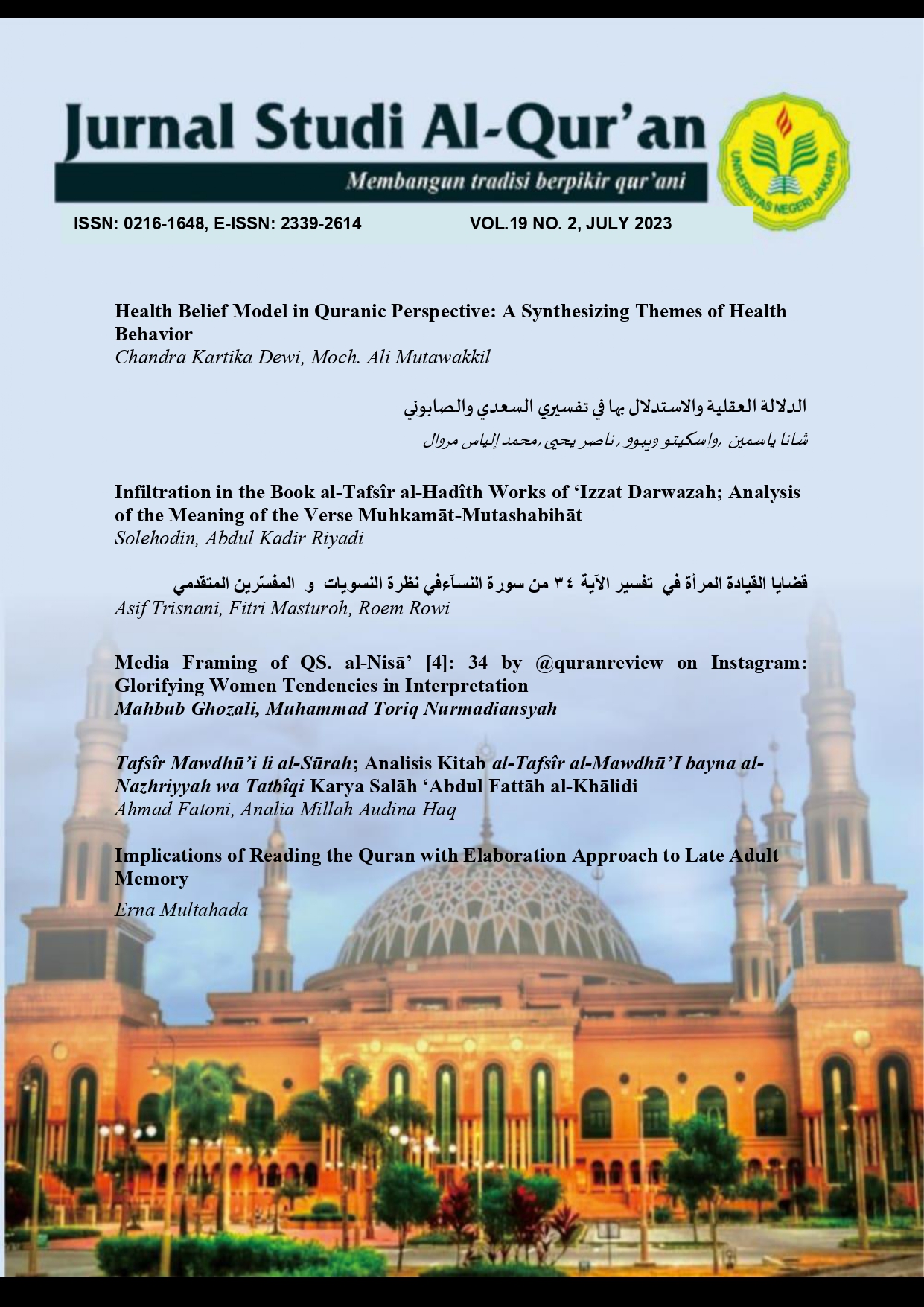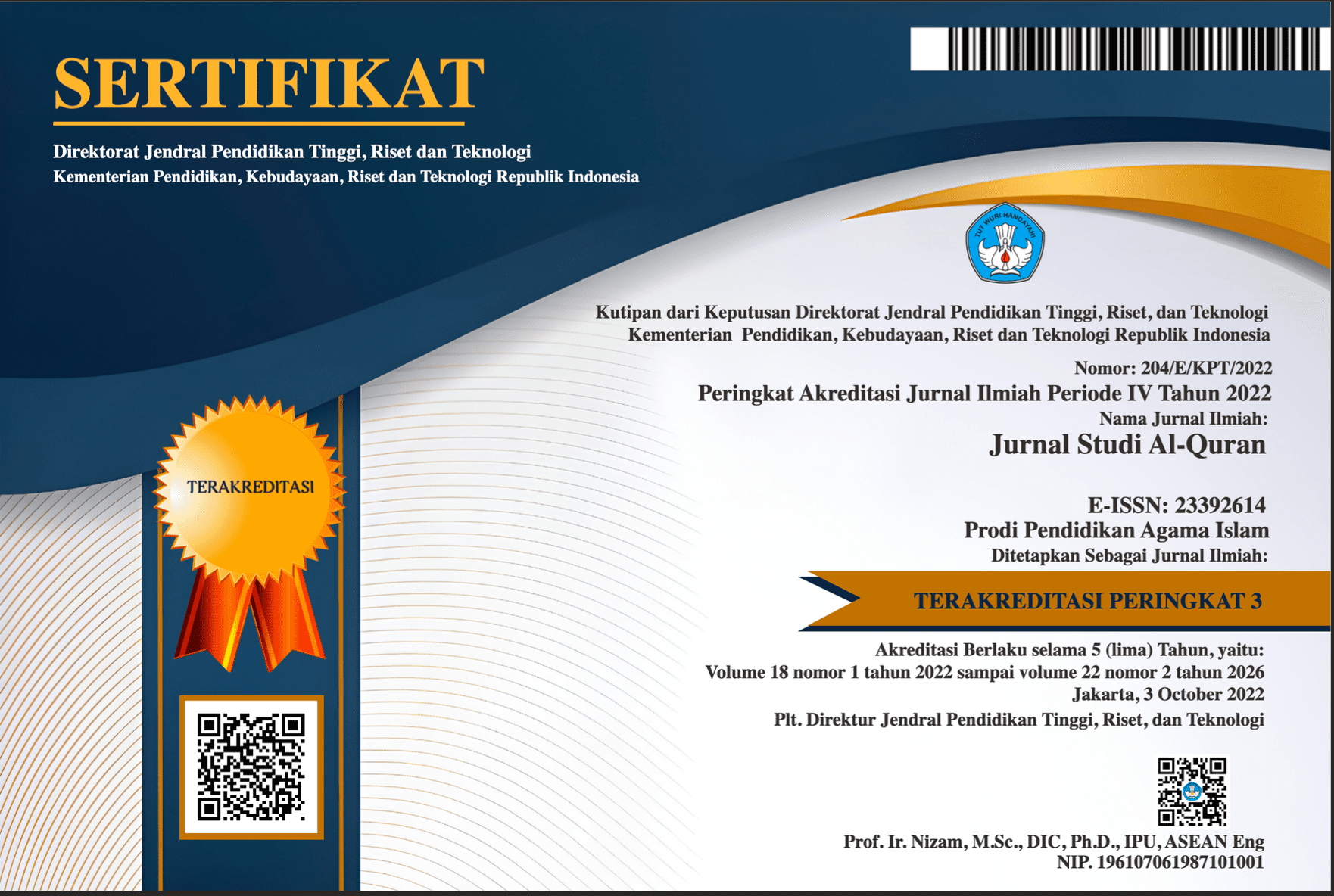Health Belief Model in Quranic Perspective: A Synthesizing themes of Health Behavior
DOI:
https://doi.org/10.21009/JSQ.019.2.01Keywords:
health belief model, al-Qur’an, self-efficacyAbstract
The encouragement of worship described by the Qur'an in various verses has another dimension related to the health belief model construction. This study aims to identify the formation of beliefs in actions that lead a person to healthy behaviours depicted in various verses by nahyu (prohibition) and amr (command). This study uses qualitative methods with a thematic analysis model to achieve this goal. A search of the various verses shows a pattern of the Qur'an's awareness of changes in actions correlated with statements about the potential risks that threaten humans that may prevent them from worshipping. Fear of the threat of danger as a driving mechanism for change in action is strengthened by motivating the benefits obtained in acting. The two aspects of consciousness, risk, and profit are driven by self-confidence that arises from awareness of servitude. The embodiment of the health beliefs model in the Qur'an represents the divine dimension that manifests in fulfilling the obligation to produce healthy behaviours.
References
Al-’Arabī, M. bin A. A. bin A. B. bin. (2003). Aḥkām al-Qur'an. Dār al-Kutub al-’Ilmīyah.
Alfurqan, A., Narulita, S., Oviyanti, F., & Masyhudi, F. (2022). Sex Education For Millenial in Islamic Perspective. PALAPA, 10(1), 138-148.
Al-Qurṭubī, M. bin A. (2006). al-Jāmi’ li Aḥkām al-Qur’ān. Muassasah al-Risālah.
Al-Rāzī, F. al-D. (1981). Mafātiḥ al-Ghayb. Dār al-Fikr.
Al-Zamakhsyarī, M. bin U. (2009). Tafsīr al-Kasysyāf ’an Ḥaqā’iq Ghawāmiḍ al-Tanzīl. Dār al-Ma’ārif.
Al-Zuḥaylī, W. (2009). al-Tafsīr al-Munīr fi al-’Aqidah wa al-Syari’ah wa al-Manhaj. Dār al-Fikr.
Allegranzi, B., Memish, Z. A., Donaldson, L., & Pittet, D. (2009). Religion and culture: Potential undercurrents influencing hand hygiene promotion in health care. American Journal of Infection Control, 37(1), 28–34. https://doi.org/10.1016/j.ajic.2008.01.014
Andriyani, A. (2019). Kajian Literatur pada Makanan dalam Perspektif Islam dan Kesehatan. Jurnal Kedokteran Dan Kesehatan, 15(2), 178–198. https://doi.org/10.24853/JKK.15.2.178-198
Bandura, A. (1977). Self-efficacy: Toward a unifying theory of behavioural change. Psychological Review, 84(2), 191–215. https://doi.org/10.1037/0033-295X.84.2.191
Bandura, A. (2018). Toward a Psychology of Human Agency: Pathways and Reflections. Perspectives on Psychological Science, 13(2), 130–136. https://doi.org/10.1177/1745691617699280
Basit, A. (2017). Health Communication in The Quran: Charles Saunders Pierce's Semiotic Analysis. Jurnal Komunikasi: Malaysian Journal of Communication, 33(4), 2017. https://doi.org/10.17576/JKMJC-2017-3304-05
Borland, R. (2017). CEOS Theory: A Comprehensive Approach to Understanding Hard to Maintain Behaviour Change. Applied Psychology: Health and Well-Being, 9(1), 3–35. https://doi.org/10.1111/APHW.12083
Bruine de Bruin, W., & Bennett, D. (2020). Relationships Between Initial COVID-19 Risk Perceptions and Protective Health Behaviors: A National Survey. American Journal of Preventive Medicine, 59(2), 157–167. https://doi.org/10.1016/J.AMEPRE.2020.05.001
Cahya, T. A. (2021). Teknik mengatasi trauma pada korban pelecehan seksual analisis teknik transferensi dan membaca Al-Qur’an: studi kasus di balai rehabilitas sosial anak paramita Mataram 2020. UIN Mataram.
Cao, J., Zhang, Z., Wang, C., Liu, J., & Zhang, L. (2019). Susceptibility assessment of landslides triggered by earthquakes in the Western Sichuan Plateau. CATENA, 175, 63–76. https://doi.org/10.1016/J.CATENA.2018.12.013
De Leeuw, E., & Hussein, A. A. (1999). Islamic health promotion and interculturalization. Health Promotion International, 14(4), 347–353. https://doi.org/10.1093/HEAPRO/14.4.347
Dhiozandi, H., & Purwanti, M. (2019). Peran Persepsi Orangtua dalam Menerapkan Pendidikan Seksualitas kepada Anak Usia 9-12 Tahun di SD X. Jurnal Perkotaan, 11(2), 119–134. https://doi.org/10.25170/PERKOTAAN.V11I2.948
Doaei, S. M. H., Rostami, M. H., & Naghizadeh, H. (2022). Mulla Sadra's Account of Systematic Analysis of Self-knowledge. Journal of Hikmat-e-Islami, 8(30), 47–68.
Esmaeili, M., Fani, M., & Karamkhani, M. (2017). The Conceptual Framework of Spiritual Health in Islamic Resources (the Quran and Nahjul-Balagha). Journal of Pizhūhish Dar Dīn va Salāmat, 3(1), 91–101.
Ghadimi, R., Kamrani, M., Zarghami, A., & Darzi, A. (2013). The Role of Nutrition in Educational and Spiritual Development of Human Beings: Quranic Perspective. Journal of Babol University of Medical Sciences, 15(1), 34–39. https://doi.org/10.18869/ACADPUB.JBUMS.15.1.34
Ghozali, M. (2015). Relevansi Sad Al-Dhari’ah Dalam Pembaharuan Hukum Islam. Qolamuna : Jurnal Studi Islam, 1(1), 1–22.
Green, E. C., Murphy, E. M., & Gryboski, K. (2020). The Health Belief Model. The Wiley Encyclopedia of Health Psychology, 211–214. https://doi.org/10.1002/9781119057840.CH68
Ḥāmidī, ’Abd al-Karīm. (2008). Maqāṣid al-Qur’an min Tashrī’ al-Aḥkām. Dār Ibn Ḥazm.
Hasan, M. Z. (2020). Resepsi al-Qur’an sebagai Medium Penyembuhan dalam Tradisi Bejampi di Lombok. Jurnal Studi Ilmu-Ilmu Al-Qur’an Dan Hadis, 21(1), 133–152. https://doi.org/10.14421/QH.2020.2101-07
Hossein Ayati, M., Eslami, M., Alimohammadzade, K., & Moghadamneya, S. H. (2019). Life Style in Medicine from Quran View. Journal of Medicine and Spiritual Cultivation, 28(1), 25–35.
Husnah, Z. binti. (2022). Pedoman Gizi Seimbang dalam al-Qur’an: Perspektif Tafsir al-Maraghi. Ushuly: Jurnal Ilmu Ushuluddin, 1(1), 26–38. https://doi.org/10.52431/USHULY.V1I1.516
Ibn' Āsyūr, M. al-T. (1984). al-Taḥrīr wa al-Tanwīr. al-Dār al-Tunisīyah li Nasyr.
Jain, K., & Kumar, A. (2021). A lightweight data transmission reduction method based on a dual prediction technique for sensor networks. Transactions on Emerging Telecommunications Technologies, 32(11), e4345. https://doi.org/10.1002/ETT.4345
Janz, N. K., & Becker, M. H. (2016). The Health Belief Model: A Decade Later. Health Education & Behavior, 11(1), 1–47. https://doi.org/10.1177/109019818401100101
Kaar, J. L., Schmiege, S. J., Vadiveloo, M., Simon, S. L., & Tovar, A. (2018). Sleep duration mediates the relationship between health behaviour patterns and obesity. Sleep Health, 4(5), 442–447. https://doi.org/10.1016/J.SLEH.2018.07.004
Khalilah, N. (2020). Perspektif al-Qur’an tentang Makanan dan Relasinya dengan Kesehatan (Study Tafsir Tematik). Universitas Nurul Jadid Probolinggo.
Khanjani, N., Khaldari, F., & Amiri, N. (2017). The viewpoint of Quran about the risk factors of non-communicable diseases. Journal of Medicine and Spiritual Cultivation, 23(3), 87–100.
Kim, J. (2020). Impact of the Perceived Threat of COVID-19 on Variety-Seeking. Australasian Marketing Journal, 28(3), 108–116. https://doi.org/10.1016/J.AUSMJ.2020.07.001
Kyngäs, H., Kääriäinen, M., & Elo, S. (2020). The Trustworthiness of Content Analysis. The Application of Content Analysis in Nursing Science Research, 41–48. https://doi.org/10.1007/978-3-030-30199-6_5
Latif, U. (2022). Dzikir dan Upaya Pemenuhan Mental-Spiritual dalam Perspektif al-Qur’an. At-Taujih : Bimbingan Dan Konseling Islam, 5(1), 28–46. https://doi.org/10.22373/taujih.v5i1.13729
Lavasani, S. M. R. (2020). Self-Confidence in Psychology and Islamic Ethics: Towards an Interpretive Framework and Its Relation to Trust in God. Religious Inquiries, 9(17), 21–44. https://doi.org/10.22034/RI.2019.93921.1176
Liong Akbar, D., & Budiyanto, B. (2020). Konsep Kesehatan Dalam Al-Qur’an Dan Hadis. Al-Bayan: Jurnal Ilmu Al-Qur’an Dan Hadist, 3(2), 157–173. https://doi.org/10.35132/ALBAYAN.V4I2.90
Lubis, A. (2017). al-Syurut wa al-Dawabit al-Syar’iyah li al-Ghada’ al-Halal: Khabrah Indonesia. Ahkam: Jurnal Ilmu Syariah, 17(1), 241–258. https://doi.org/10.15408/AJIS.V17I1.6222
Miles, M. B., & Huberman, A. M. (1984). Qualitative Data Analysis (a Sourcebook of New Methods). SAGE Publications.
Millie, J., & Hosen, N. (2022). Freedom from Consumption: The Reformist Critique of Consumptive Islam in Indonesia. Asian Studies Review. https://doi.org/10.1080/10357823.2022.2110859
Moazedi, K., & Asadi, A. (2012). Mental Health Status in the Quran. Journal of Ardabil University of Medical Sciences, 12(1), 85–96.
Mushlihin, M., Narulita, S., & Aulia, R. N. (2021). Education and the formation of Islam Nusantara: Epistemology, Direction and Sustainability. Hayula: Indonesian Journal of Multidisciplinary Islamic Studies, 5(2), 261-270.
Nodehi, D., Abarghuei, M. A., & Azizi, A. (2017). Providing A Mental Health Concept Based On Human Health Indexes in Quran. Pharmacophore an International Research Journal, 8(2), 64–82.
Okolie, U. C. (2022). Work placement learning and students' readiness for school-to-work transition: Do perceived employability and faculty supervisor support matter? Journal of Vocational Behavior, 139, 103805. https://doi.org/10.1016/J.JVB.2022.103805
Onu, D. U., Onyedibe, M. C. C., Ugwu, L. E., & Nche, G. C. (2019). Relationship between religious commitment and academic dishonesty: is self-efficacy a factor? Ethics & Behavior, 31(1), 13–20. https://doi.org/10.1080/10508422.2019.1695618
Porcelli, P. (2020). Fear, Anxiety and Health-Related Consequences After the Covid-19 Epidemic. Clinical Neuropsychiatry, 17(2), 103. https://doi.org/10.36131/CN20200215
Quṭb, S. (2003). Fī Ẓilāl al-Qur’ān. Dār al-Syurūq.
Rafiq, A. (2021). The Living Qur'an: Its Text and Practice in the Function of the Scripture. Jurnal Studi Ilmu-Ilmu Al-Qur’an Dan Hadis, 22(2), 469–484. https://doi.org/10.14421/QH.2021.2202-10
Rahman, F. (1994). Major Themes of The Qur'an. Bibliotheca Islamica.
Roberto, A. J., Goodall, C. E., & Witte, K. (2020). Raising the Alarm and Calming Fears: Perceived Threat and Efficacy During Risk and Crisis. In Handbook of Risk and Crisis Communication. Routledge. https://doi.org/10.4324/9781003070726-16
Rofi’i, R., Dasuki, A., & Hasan, A. F. (2021). Al-Qur’an sebagai Mantra: Ayat Perisai Diri pada Masyarakat Muslim di Hanjalipan, Kotawaringin Timur. NALAR: Jurnal Peradaban Dan Pemikiran Islam, 5(2), 130–136. https://doi.org/10.23971/NJPPI.V5I2.3959
Safee, M. A. M., Saudi, M. M., Pitchay, S. A., Ridzuan, F., Basir, N., Saadan, K., & Nabila, F. (2018). Hybrid Search Approach for Retrieving Medical and Health Science Knowledge from Quran. International Journal of Engineering & Technology, 7(4.15), 69–74. https://doi.org/10.14419/ijet.v7i4.15.21374
Saritoprak, S. N., Exline, J. J., & Abu-Raiya, H. (2020). Spiritual Jihad as an Emerging Psychological Concept: Connections with Religious/Spiritual Struggles, Virtues, and Perceived Growth. Journal of Muslim Mental Health, 14(2). https://doi.org/https://doi.org/10.3998/jmmh.10381607.0014.205
Setiyaningsih, R., Tamtomo, D., & Suryani, N. (2016). Health Belief Model: Determinants of Hypertension Prevention BehaviorinAdults at Community Health Center, Sukoharjo, Central Java. Journal of Health Promotion and Behavior, 01(03), 160–170. https://doi.org/10.26911/THEJHPB.2016.01.03.03
Shihab, M. Q. (2005). Tafsir al-Misbah: Pesan, Kesan dan Keserasian al-Qur’an. Lentera Hati.
Shmueli, L. (2021). Predicting intention to receive the COVID-19 vaccine among the general population using the health belief model and the theory of planned behaviour model. BMC Public Health, 21(1), 804. https://doi.org/10.1186/S12889-021-10816-7/TABLES/4
Stewart, C., Wong, S. K. Y., & Sung, J. J. Y. (2021). Mapping ethical-legal principles for the use of artificial intelligence in gastroenterology. Journal of Gastroenterology and Hepatology, 36(5), 1143–1148. https://doi.org/10.1111/JGH.15521
Venny, Z. (2021). Makanan Berkhasiat Obat dalam al-Qur’an dan Korelasinya dalam Pencegahan COVID-19. UIN Raden Intan Lampung.
Yousofi, H., Abdolkarimi-Natanzi, M., & Nessaiy-Barzoki, H. (2020). The principles of spiritual health in the Quran. KAUMS Journal ( FEYZ ), 23(7), 810–816.
Zaman, A. R. B. (2020). Living Qur’an dalam Konteks Masyarakat Pedesaan (Studi pada Magisitas al-Qur’an di Desa Mujur Lor, Cilacap). Potret Pemikiran, 24(2), 143–157. https://doi.org/10.30984/PP.V24I2.1320
Downloads
Published
How to Cite
Issue
Section
License
Authors who publish with this Journal agree to the following terms:
- Author retain copyright and grant the journal right of first publication with the work simultaneously licensed under a creative commons attribution licensethat allow others to share the work within an acknowledgement of the work’s authorship and initial publication of this journal.
- Authors are able to enter into separate, additional contractual arrangementfor the non-exclusive distribution of the journal’s published version of the work (e.g. acknowledgement of its initial publication in this journal).
- Authors are permitted and encouraged to post their work online(e.g. in institutional repositories or on their websites) prior to and during the submission process, as it can lead to productive exchanges, as well as earlier and greater citation of published works.
Users/public use of this website will be licensed to CC BY










